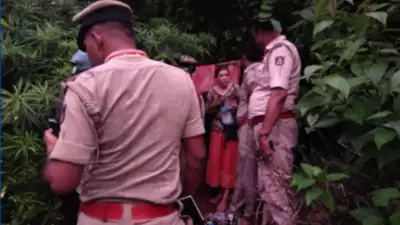In the sacred hills of Ramatirtha near Kumta in Karnataka, an unusual story unfolded, a tale of solitude, spirituality, and survival.Last week, a routine police patrol turned into something out of a novel when officersdiscovered a Russian woman and her two young children living deep inside a cave. The woman, identified as 40-year-old Nina Kutina, also known locally as Mohi, had been residing there in isolation for nearly two weeks, along with her daughters Preya (6) and Ama (4). What stunned authorities was not just the setting, a natural cave tucked away in dense jungle, but the fact that Mohi’s visa had expired eight years ago, in 2017.Mohi’s journey to the remote hill cave reportedly began years earlier, when she arrived in India on a business visa. From Goa, she eventually found her way to Gokarna, a coastal temple town in Karnataka known for attracting spiritual seekers and sadhus. There, she immersed herself in Hindu philosophy and Indian spiritual traditions, captivated enough to detach herself from the outside world.Read more: 7 places to visit near Delhi within 250 km (2025 Edition)Her modest makeshift home inside the cave was no more than a survival space, minimal and sacred. Inside, she kept a Rudra idol and spent her days performing puja and meditating, all while caring for her two young children. No electricity. No help. Just prayer, rituals, and the forest.On Friday, during a routine patrol following a landslide alert in the area, Circle Police Inspector Sridhar and his team noticed something strange, sarees and other clothes hanging to dry outside a cave entrance. Curious, they navigated the treacherous terrain and discovered the trio inside.Uttara Kannada Superintendent of Police M Narayana told PTI, “Our patrolling team spotted saree and other clothes being hung for drying outside the cave in Ramatirtha Hill. When they went there, they spotted Mohi along with her children Preya and Ama.”The discovery left officials stunned, especially considering the challenging conditions of the area. He further noted, “It was quite surprising how she and her children survived in the woods and what they ate,” Narayana said. “Thankfully, nothing untoward happened to her or the children during their time in the forest.”Read more: Understanding Customs and Immigration: What travellers need to knowPreliminary investigations suggest Mohi had made her way to the cave from Goa, although how long she had been off the radar is still unclear. Officials believe she may have been leading a nomadic or reclusive lifestyle in various places across India before arriving in Gokarna.Authorities have now moved Mohi and her children to a nearby ashram run by a Sadhvi, where they are being taken care of.“We have arranged her stay in an ashram, run by a Sadhvi,” Narayana stated. “We have initiated the process to take her to Bengaluru from Gokarna and begin the deportation process.”The Russian Embassy has been contacted via a local NGO to start formal deportation proceedings. Meanwhile, questions linger—not just about visa violations, but about the deeply personal journey that led one woman to renounce modern life and raise her children in the wilderness of coastal Karnataka.Was it an act of spiritual awakening, or a tale of escape? For now, Mohi’s story remains as mysterious as the cave she called home.
